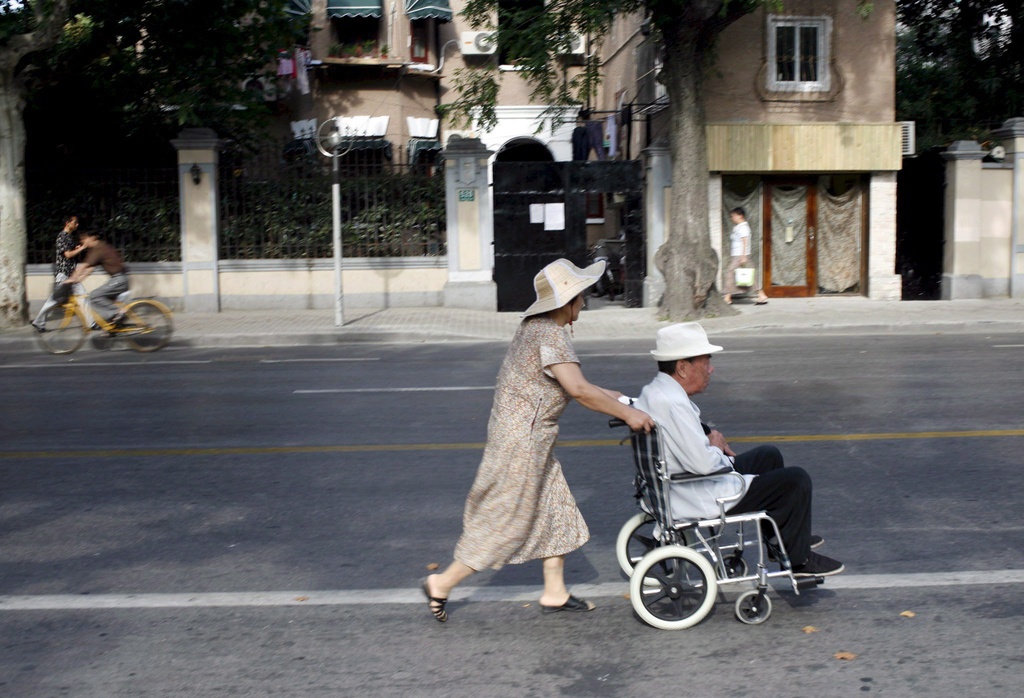
Foreign workers squeezed by new Chinese law

Paying half their wages into social security – since autumn that’s been the harsh reality for the 230,000 foreigners working in China, many already taxed at home.
Swiss expats and business representatives are by and large unhappy with the situation and have appealed to Bern for help.
Forced to pay unemployment insurance? Fair enough. But according to Chinese law, foreigners who lose their job have to leave the country. Medical cover? Great, but that’s only for public hospitals, into which foreigners rarely venture.
A pension fund? Good idea, but when foreign workers retire, they are asked to return home. Maternity benefit? OK, but what happens if you have a second or third child in a country with a one-child policy?
These are some of the unanswered questions raised by China’s new social security law.
Since October 15, every foreigner with a permit to work in China is supposed to pay tax.
The sum can be up to 50 per cent of their salary, of which three-quarters is paid by the employer and one quarter by the employee.
“Adapt!”
“If I have to pay anything, I’m going to resign and leave China,” said one Swiss in Beijing who works for a Swiss employer.
Like the vast majority of his expatriate colleagues, he remains connected to the Swiss system and would thus be taxed twice. Many people think this is unacceptable.
“You work in China – so adapt to Chinese laws.” This was the response of Xu Yanjun, head of the Chinese ministry for human resources and social security, at a media conference at the end of October.
He had called the gathering to try to explain the contradictions of the new law. In fact, all he succeeded in doing was adding to the confusion, admitting that modes of enforcement had yet to be established.
By mid-December, people still don’t know how much, where and how to pay.
The only certainty – hammered out by Xu – is that the law is in force.
Exemption
“What bothers us is that this law appeared unexpectedly,” said Robert Wiest, vice-president of the Sino-Swiss chamber of commerce in Beijing. “But our aim is not to oppose it.”
In August, however, the chamber of commerce asked the Swiss government to intervene and limit the negative impact the law would have on the business community in China.
The chamber’s position, relayed to Bern via the Swiss embassy in Beijing, stresses the desire to obtain an exemption for those employees already taxed in Switzerland.
Germany and South Korea already enjoy an exemption agreement. Ten or so other countries – including France and Belgium – have begun talks with China.
After a long silence, the Federal Social Insurance Office said it was prepared at the beginning of November to open exploratory talks with China.
Stéphanie Koch, in charge of the dossier at the federal office, confirmed Switzerland wanted to send a delegation to China in the second half of 2012. The exact date will depend on the Chinese diaries.
Koch said that if it’s decided to begin negotiations with a view to a bilateral agreement on social insurance – and if this agreement foresees a tax exemption – it will apply in principle to both parties.
“Normal evolution”
In the meantime, employers are building up reserves for the day when they have to pay up.
The bill’s going to be steep, especially for those who employ many foreigners.
The law does, however, contain a cap – equivalent to three times the average local salary. Thus contributions shouldn’t exceed SFr600-700 ($640- 745) per month per worker.
That’s just the beginning, said Wiest, who expects the introduction of other taxes in the coming years.
“I think that’s part of the normal evolution of a country that wants to develop its social security system,” he said. “All the same, the fact is that doing business in China is becoming increasingly expensive.”
In response to the concerns of foreign companies, Xinhua, the official news agency, sharply criticised their claims for special treatment.
Not all bad
But not all foreigners complain. Batiste Pilet, representative in China of a Geneva travel agency, will pay like everyone else.
Because his first job was in Beijing, he’s never been taxed in Switzerland. And the fact that he married a Chinese means he can stay in China even if he loses his job.
“When I retire in 30 years, it’s possible that retirement in China will have become
attractive,” he said.
“Maybe there’ll be foreigners who dream of benefiting from it.”
The new social security law only affects the 720 or so Swiss citizens who have been issued with work permits for mainland China. Residents of Hong Kong and Macao are not concerned.
About 300 Swiss companies are established in China, in addition to about 700 branches of Swiss companies.
Chinese GDP 2010: $5,878 billion
Change over previous year: +10.3%
Per capita GDP: $4,393
Swiss colony: 3,503
Swiss exports 2010: SFr7.467 billion
Change over previous year: +35.7%
Swiss imports 2010: SFr 6.085 billion
Change over previous year: +17.9%
(Source: Swiss foreign ministry. Data do not include Hong Kong, Macao and Taiwan)
(Translated by Thomas Stephens)

In compliance with the JTI standards
More: SWI swissinfo.ch certified by the Journalism Trust Initiative




























You can find an overview of ongoing debates with our journalists here . Please join us!
If you want to start a conversation about a topic raised in this article or want to report factual errors, email us at english@swissinfo.ch.